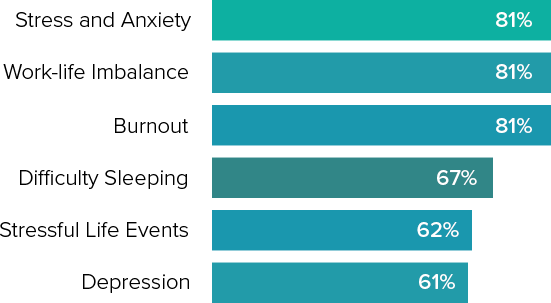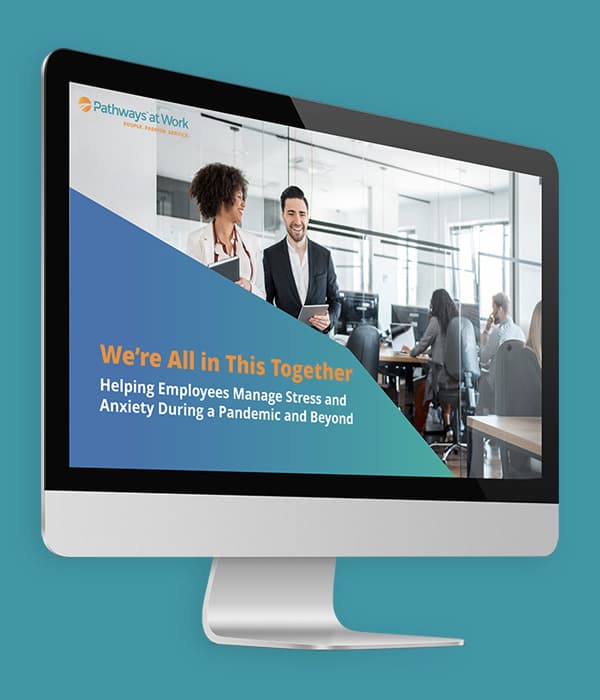
CASE STUDY
Providing a Consulting Firm with Customized Training and Support for Employee Mental and Behavioral Health
Background
Many employees have been experiencing unprecedented challenges to their mental and behavioral health and well-being, including increased stress and anxiety, work-life imbalance, and burnout due to the pandemic. [1] [2]
To help employees manage their mental and behavioral health and well-being, many employers have expanded access to mental health services and provided behavioral health training for managers and employees. [3] [4]
Sapper, a marketing and sales consulting company based in St. Louis, MO with approximately 200 employees, requested Pathways to survey its employees to evaluate their mental and behavioral health and well-being and to provide virtual educational courses to help employees manage identified mental and behavioral health concerns.

Employee Mental Health Survey
Pathways developed an anonymous survey to evaluate the mental and behavioral health concerns of the Sapper’s employees. The survey invited employees to indicate their level of concern about issues that might affect their mental and behavioral health (i.e., very concerned, moderately concerned, slightly concerned, not concerned). Approximately 60% of the company’s employees completed the survey during September 2020.
Employees who completed the survey identified the following mental and behavioral health issues about which they were very concerned or moderately concerned.
Stress and anxiety, work-life imbalance, and burnout were the most frequently identified mental and behavioral health concerns. Other common mental and behavioral health concerns were difficulty sleeping, stressful life events, and depression. These survey results are consistent with the results of many other employee surveys, which have consistently documented significant increases in challenges to employee mental and behavioral health and well-being due to the pandemic. [1] [2]

“We were aware of the elevated stress levels of our employees, but the Pathways at Work survey process identified the mental health issues that, when addressed, would make the most impact on the culture at Sapper.”
Marissa Tebeau, VP of Human Resources, Sapper
Pathways Educational Courses
As the survey demonstrated widespread mental and behavioral health concerns among employees, the company’s human resources leaders requested Pathways behavioral health professionals to provide educational courses, training, and coaching with practical advice and tools to help employees manage their most significant mental and behavioral health concerns: stress and anxiety, work-life imbalance, and burnout.
Consistent with CDC recommendations on the value of virtual educational programs to help employees manage mental and behavioral health issues (5), the Pathways educational courses were designed for virtual presentation, as most of the company’s employees were working remotely due to the pandemic.
The Pathways educational courses were scheduled monthly for 60 minutes each, available live or recorded, and allowed voluntary attendance. The live courses were designed to be interactive and included opportunities for real-time surveys and chat. The courses, led by Pathways behavioral health specialists, provided practical mental and behavioral health advice and information on available behavioral health resources.

Results
Training workshops were provided to the company’s employees by Pathways behavioral health specialists during September 2020 – February 2021. The educational courses, which were designed to address the most frequent mental and behavioral health concerns identified in the employee survey, addressed the following topics:
- Controlling Stress and Anxiety
- Improving Efficiency
- Managing Conflicts
- Preventing Burnout
- Improving Work-Life Balance
- Managing Financial Stress
Employees were invited to complete evaluations after each course. The course evaluations were very favorable, with more than 90% of respondents indicating the courses provided practical information to help employees manage their mental and behavioral health concerns.
Employees were also invited to provide personal comments after each of the courses. Approximately one-third of the attendees provided individual comments. Typical of the employee comments on the educational courses are the following:
Employee Feedback
"I feel this is something I drastically need, as this year has been difficult in so many ways."
“The scenarios mentioned were very familiar, and made me feel less alone in my struggles. The solutions and advice provided … were also helpful.”
“I appreciated the educational component to help me realize some of the signals of stress in my everyday life... Loved being able to have actionable insight.”
“I gained a lot of information in the Q&A section because it made me realize many people have the same stresses and anxieties as me; most of the questions are questions I also had.”

Conclusion
The Pathways employee mental and behavioral health survey demonstrated that employees in this case study have significant challenges to their mental and behavioral health and well-being due to the pandemic. Stress and anxiety, work-life balance, and burnout were the most frequent causes for employee concern. Other frequent causes for employee concern were: difficulty sleeping, managing stressful life events, and managing depression.
The educational courses which Pathways behavioral health specialists presented to address employee mental and behavioral health concerns demonstrate that behavioral health courses can be effectively provided to employees through virtual technology.
Voluntary employee attendance at the educational courses shows that employees will participate in educational courses that provide information employees consider to be relevant and practical.
The employee evaluations of the educational courses demonstrate that employees consider virtual courses effective for mental and behavioral health support.
Although this case study is limited to the employees of a single company, surveys of the mental and behavioral health concerns of employees at other companies have demonstrated similar behavioral health concerns among employees and favorable employee responses to virtual behavioral health courses. [6]
This case study suggests that to help employees manage their behavioral health challenges, employers should survey their employees to prioritize their behavioral health concerns and provide virtual educational courses to support employees’ mental and behavioral health and well-being.
To learn more about Sapper Consulting, please visit sapperconsulting.com

About Pathways at Work
Our Pathways at Work Program is a series of customized webinars, on-demand training, tools, and interactive discussion groups designed to help employees manage overall anxiety and the stress caused by the pandemic and concerns about racism and social injustice. Pathways delivers tens of thousands of trainings and millions of services each year.
Footnotes:
- CDC: Czeisler M, Lane R, Petrosky E, et al: Mental health, substance use, and suicidal ideation during the COVID-19 pandemic – United States, June 24-30, 2020; MMWR: 2020; 69 (32): 1049 – 1057. ( https://www.cdc.gov/coronavirus/2019-ncov/community/mental-health-non-healthcare.html )
- Kaiser Family Foundation: Panchal N, Kamal R, Cox C, et al: The implications of COVID-19 for Mental Health and Substance Use; 2021: February 10. ( The Implications of COVID-19 for Mental Health and Substance Use | KFF )
- Willis Towers Watson: Emerging from the pandemic survey; 2021; February 24 ( https://www.willistowerswatson.com/en-US/Insights/2021/02/2021-emerging-from-the-pandemic-survey )
- Mercer: National survey of employer-sponsored health plans; 2020; October 1 ( https://www.mercer.com/newsroom/health-benefit-costs-expected-to-grow-4-4-in-2021-as-employers-face-continued-economic-uncertainty-mercer-survey-finds.html )
- CDC: Worksite health scorecard manual; 2019; January.
- Pathways: Kelly JT: Supporting employee behavioral health and well-being during the pandemic (https://www.pathways.com/managing-the-challenges-of-racism-and-social-injustice).



